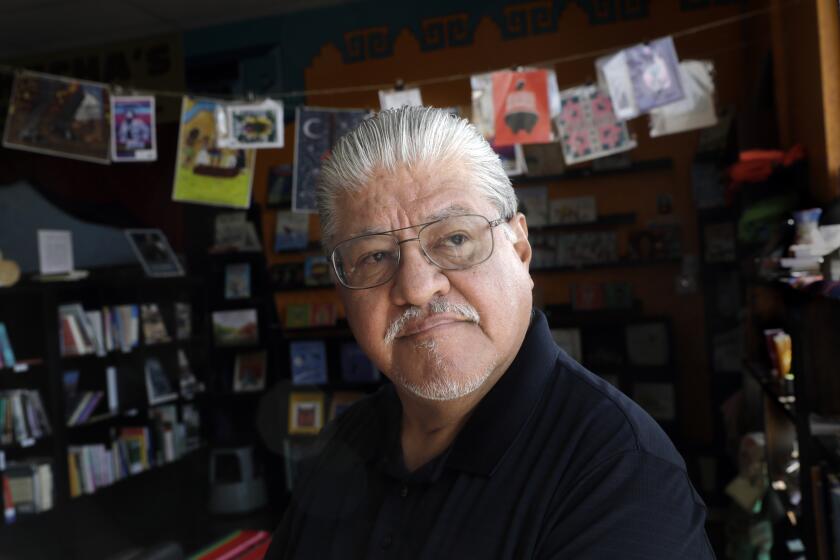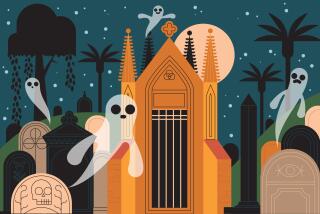‘Speculative Los Angeles,’ otherworldly stories set in a sprawling, haunted place
On the Shelf
Speculative Los Angeles
Ed. by Denise Hamilton
Akashic: 256 pages, $26
If you buy books linked on our site, The Times may earn a commission from Bookshop.org, whose fees support independent bookstores.
In a landfill in La Puente, fighters engage in bloody battle by piloting scrap metal machines called chompers while spectators eat tacos and drink boba; on a quiet residential street in the San Fernando Valley, an abused girl calls on a mysterious tree spirit for help. One of the sculptures of ancient mammoths in the La Brea Tar Pits up and disappears, and in El Sereno, a child is reunited with his mother after being detained by ICE … but is the child who returns the same as the one they took?
Welcome to the surreal landscapes of “Speculative Los Angeles,” a new anthology populated by stories from writers — including Charles Yu, Luis Rodriguez and Lynell George — who are mostly native to the city, though often new to the brainy tangles of speculative fiction.
The homage to L.A.’s fantastical potentialities was dreamed up by Denise Hamilton, an L.A. native and Edgar Award-winning crime novelist. Her third anthology in collaboration with Akashic Books, it follows on the heels of “Los Angeles Noir” and “Los Angeles Noir 2: The Classics.”
As she explained in a recent phone call, Hamilton had long intended to complete an L.A. trilogy of collections. “I was always thinking, OK, well, what’s the third step?” she said. “What else can we do?”
Hamilton, who previously worked for The Times as a Metro reporter, ultimately chose speculative fiction because it fit the mode of the city so well. “To me, L.A. is already half speculative and phantasmagorical,” she said. “Hollywood, artifice, reality, fantasy — no one is who they seem. JPL is here, NASA. I wanted to have alternative timelines. I wanted shape-shifters, coyote gods, whatever people came up with.”
Drawing on Octavia E. Butler’s journals and notes, “A Handful of Earth, A Handful of Sky” offers a glimpse inside her journey to becoming a science fiction writer.
To fulfill that vision, Hamilton put together a contributor list that focused less on literary pedigree (though there’s plenty of that) and more on writers she thought would bring something vital to the project — longtime Angelenos who would be able to illuminate disparate geographic corners of the sprawling city. “I tried to find authors whose writing about Los Angeles was specific and transformative and innovative,” she said. “Sci-fi has a reputation of being white guys but wonderfully, recently, there had just been an explosion of diverse sci-fi. I wanted to harness that for this collection.”
The group includes writers such as S. Qiouyi Lu, whose short fiction Hamilton had seen in sci-fi magazines, as well as George, better known for her nonfiction, alongside L.A. icons like Rodriguez, L.A.’s former poet laureate, and Francesca Lia Block (“Weetzie Bat”).
The only instructions Hamilton gave the authors: Pick a specific neighborhood. The rest was up to them.
The result is a swath of tales that are both wildly imaginative and emotionally grounded, speculations that not only imagine our possible futures but illuminate the collective anxieties of our unsettled and unsettling present.
In his story, “Jaguar’s Breath,” Rodriguez describes a post-Big One scenario in which refugee families take to the Angeles National Forest to hide out from the search drones of a fascist political party called America First. Duane Swierczynski’s “Walk of Fame” sees cults of psychics telepathically murdering people for the crime of seeking public recognition.
As diverse as the stories are, there are common threads: repeated mentions of rising sea levels and inland-creeping coasts, triple-digit winter temperatures and income gaps that force most to live on the margins while serving the spectacularly rich.
That communal hum didn’t surprise Hamilton at all. “I think that writers, especially fantasy and speculative fiction writers, they’ve got their finger on the pulse of stuff that’s just floating in the ether,” she said. “Tom Waits has this great quote about, ‘Where do you get your ideas?’ He says, ‘The ideas are like floating through the air above your head, and you’ve just got to grab one and wrestle it to the ground like a chicken.’”
Steph Cha shares a meal and some notes on performing identity with the “Interior Chinatown” author.
In this case, the floating ideas coalesced. What Hamilton calls “this quivering, shimmering low-grade anxiety over climate change” pops up stealthily, over and over. “It’s just these tossed-aside comments: The canyon is boarded off, it’s always 100 degrees now, there are no seasons.” That makes sense to Hamilton: “We’re perched on the edge of this giant cliff of a continent, and we’ve imagined this city of 12 million into being, but it is so precarious. We are so close to that wavering edge.” For her, “That’s what speculative fiction does best.” It looks at the edge of where we are and lets itself imagine where we might go.
“Speculative Los Angeles” was compiled before the pandemic, drawing on a city that to a certain extent no longer exists. Hamilton did final edits while locked down in her Glendale home. “The Black Lives Matter protests were really kicking into high gear, and babies, toddlers, children being ripped from their parents,” she said. “The theater of cruelty and the actual cruelty. I was so glad to see so much of that reflected in the collection.”
But she also saw, in all the dystopias, glimmers of escape. “The stories are not 100% grim and hopeless and defeated. … We get to know the characters as individuals, and there is hope and there is persistence. We can’t go on, we must go on.”
Hamilton hopes that the collection will help readers connect to L.A.’s spectral features, the ghostly layers of a shapeshifting city. “There’s this haunted quality to the place,” she said — even when it’s not mid-shutdown. “You go to the Hollywood Forever Cemetery, or up into the Hollywood Hills, or where Sharon Tate was killed. You go to the Chatsworth Burro Flats where there are Chumash pictographs and caves. … The whole city has it.”
Which, for her, is why Los Angeles will always be a personal, magical muse. Despite its reputation as a hotbed of hot blondes and Hollywood stereotypes, a sunshine land that dwells in the eternal present, Hamilton knows what all true Angelenos do: that the city is more diverse than any single story, or even collection of stories, could express. “It’s almost like this whole alternate reality that exists,” she said, “but you have to pierce the veil of your reality to peer into it.”
Luis J. Rodriguez on his new book, ‘From Our Land to Our Land’; his experience as L.A. poet laureate, and the issues surrounding ‘American Dirt’
Romanoff is a writer and the author of several novels for young adults.
More to Read
Sign up for our Book Club newsletter
Get the latest news, events and more from the Los Angeles Times Book Club, and help us get L.A. reading and talking.
You may occasionally receive promotional content from the Los Angeles Times.









